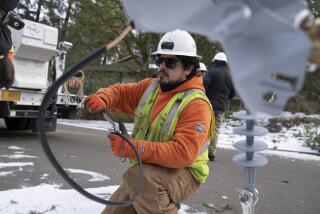Jobs Are Out There but Tough to Find : Employment: The market has tightened markedly in recent months, but accountants, nurses and bill collectors are still needed.
- Share via
WASHINGTON — Americans scouring for work are finding that some jobs seem impervious to recession--the nation still needs accountants, plumbers, nurses and bill collectors. Still, the openings are tough to find and the competition is fiercer than ever.
“If you were good before, you have to be excellent today. You have to be doubly trained to get the same job as you did a year ago. The employers want twice (the employee) for the money,” said Ron De Sure of Job Direction Inc., a nationwide employment firm based in Fairlawn, Ohio, a suburb of Akron.
The job market has tightened markedly in recent months as the tumbling economy has forced employers to lay off workers or scale back hiring plans. Since October, nearly 1 million people have joined the ranks of the unemployed. Payroll cuts have hit nearly all sectors, from factories to department stores to construction sites.
Even a mild recession could cost the nation another 1 million jobs in coming months, many analysts predict, meaning even steeper competition for fewer jobs.
Although the job losses have been broad-based, some fields still have work to offer, employment experts say.
Nurses, accountants and computer programmers are still in demand, according to help-wanted ads in newspapers in Los Angeles, St. Louis, Phoenix and Washington. Dental assistants, legal secretaries and auto mechanics are also on the most-sought list.
A smattering of other jobs is commonly listed too--from plumbers to custodians to civil engineers to truck drivers.
“There are jobs across the board; there just aren’t as many of them,” said Pat Southerland, president of Robert Half of Washington, a placement firm that specializes in financial personnel.
One area that is booming, largely because of the sour economy, is the collection business.
“Before, if you had outstanding bills, you might have let it slide an extra month or two. Now, businesses can’t afford to do that,” Morgan said.
As a recession wears on, less skilled people have a tougher time because people with higher skills become desperate and take jobs below their skills, said Barry Bluestone, a labor economist at the University of Massachusetts.
During the last recession in 1981-82, Bluestone said, fast-food chains were able to hire educated, middle-aged people--rather than high school dropouts--for burger-flipping jobs.
“It used to be firms would go out and train high school dropouts. Now they will have the pick of the crop of not only high school graduates but college graduates,” Bluestone said.
More to Read
Inside the business of entertainment
The Wide Shot brings you news, analysis and insights on everything from streaming wars to production — and what it all means for the future.
You may occasionally receive promotional content from the Los Angeles Times.










